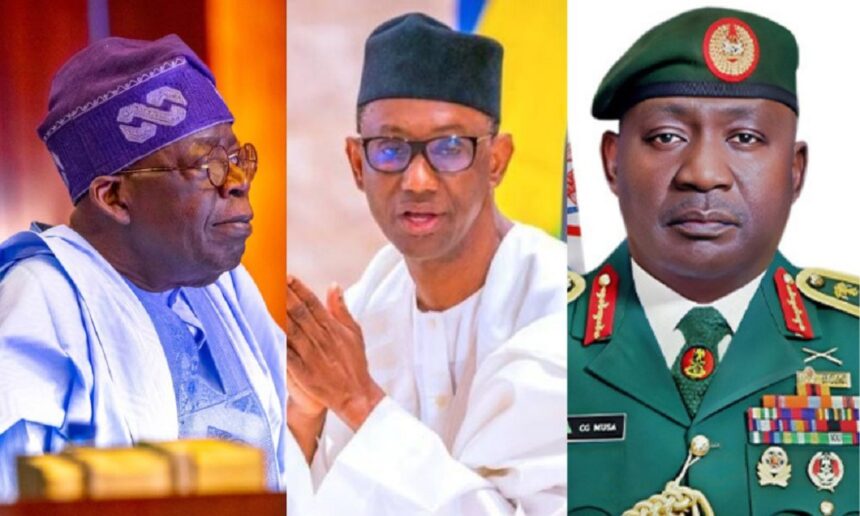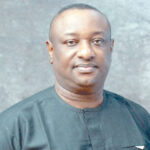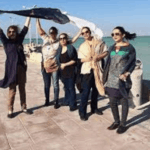…says President dished out fresh directives
The National Security Adviser (NSA), Nuhu Ribadu, has disclosed what the high-level security meeting alongside the Chief of Defence Staff (CDS), General Christopher Musa, and other security chiefs discussed with the President, Bola Tinubu, on Wednesday, at the Presidential Villa, Abuja.
The security officials arrived at the Villa around 3:00 p.m. and proceeded into a closed-door session with the President at his official residence, amid mounting concerns over a resurgence of deadly attacks in the Middle Belt region, particularly in Plateau and Benue States, as well as Borno State.
The meeting, described by sources as “crucial,” comes against the backdrop of a series of violent assaults by unidentified assailants that have left dozens dead in the last three weeks. Entire communities have been displaced in what appear to be coordinated attacks on defenseless rural populations.
Despite the scale of the carnage, security agencies have yet to announce any arrests, fuelling public outcry over the impunity surrounding the killings and the perceived lack of adequate response from the authorities. Benue State Governor Hyacinth Alia has blamed the violence on foreign elements, claiming that the attackers “do not speak the language” of the local communities, suggesting an influx of armed outsiders as the cause of the deadly raids.
Speaking to journalists after the meeting, NSA Nuhu Ribadu said the session with the President was lengthy, exhaustive, and detailed. “Yes, it was gracious of Mr. President to give us the opportunity to come and brief him. The meeting lasted a long time. We provided him with an update on what has been happening, including developments during his time away,” Ribadu said.
“Even while he was out of the country, he remained in constant touch. He gave directives and followed developments closely. Today, we who are in charge of security had the opportunity to brief him thoroughly—for hours. It was a very detailed and exhaustive session. We covered everything from A to Z.”
According to the NSA, the President issued fresh directives and emphasised his commitment to restoring peace and stability across the country. Ribadu revealed that the service chiefs had been deployed to critical hotspots, including Plateau, Benue, and Borno States, in line with Tinubu’s instructions.
“We reported back to him, as he had instructed us to engage with political authorities in those areas. Insecurity is not just a government issue; it often involves local sub-units who are directly in touch with the people,” Ribadu said. “Many of these challenges are community-related. To address this, it is essential to work with communities, local governments, and especially state governors. The President continues to emphasise this, and we are following through.”
Ribadu also underscored the urgency with which the administration is tackling the crisis: “He [President Tinubu] is deeply concerned and worried. He has insisted that enough is enough. We are working to ensure that peace and security are restored. Everyone is involved – the Armed Forces, civil police, and intelligence community are all on the ground, working 24 hours a day.”
While acknowledging that total security is yet to be achieved, Ribadu said the country is “on the right course,” with improved conditions in recent months.
“We do not underestimate the loss of even one life. We do not take it lightly. But certainly, a lot has changed and improved,” he said. “We will not stop until we achieve results.”
On the deteriorating situation in Borno State, Ribadu explained that recent escalations were largely driven by insurgents deploying improvised explosive devices (IEDs) to target civilians.
“These evil people don’t just sit and accept defeat,” he noted. “They try to make a statement. Most of the casualties we’ve seen have been from IEDs.”
He added that opportunistic attacks also occur during lulls in violence, undermining long stretches of peace. “When that happens, people tend to forget the peaceful days and focus only on the bad incident. But there are people out there who do not sleep, who make enormous sacrifices just to ensure this semblance of peace. And they will continue to do so.”
The security crisis has drawn sharp criticism from civil society groups and lawmakers, who are calling for urgent and decisive action to protect vulnerable populations. President Tinubu, who only recently returned from a private visit to Europe, had previously condemned the spate of violence.
Wednesday’s emergency meeting with his top security chiefs signals growing concern at the highest levels of government.
In attendance were Ribadu; Director General of the Department of State Services (DSS), Oluwatosin Ajayi; DIG Police Head Force Intelligence. Benjamin Okolo; Director General of National Intelligence Agency (NIA), Mohammed Mohammed, Chief of Defence Intelligence Agency (CDI), and Gen. Emmanuel Undianeye.
ALSO READ TOP STORIES FROM NIGERIAN TRIBUNE






